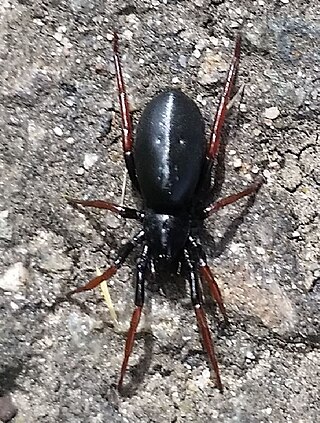
Ground spiders comprise Gnaphosidae, the seventh largest spider family with over 2,000 described species in over 100 genera distributed worldwide. There are 105 species known to central Europe, and common genera include Gnaphosa, Drassodes, Micaria, Cesonia, Zelotes and many others. They are closely related to Clubionidae. At present, no ground spiders are known to be seriously venomous to humans.

Tegenaria is a genus of fast-running funnel weavers that occupy much of the Northern Hemisphere except for Japan and Indonesia. It was first described by Pierre André Latreille in 1804, though many of its species have been moved elsewhere. The majority of these were moved to Eratigena, including the giant house spider and the hobo spider.

Synageles is a genus of jumping spiders that was first described by Eugène Louis Simon in 1876.

Alopecosa is a spider genus in the family Lycosidae, with about 160 species. They have a largely Eurasian distribution, although some species are found in North Africa and North America.

Drassodes is a genus of ground spiders that was first described by Niklas Westring in 1851. They are brown, gray, and red spiders that live under rocks or bark in mostly dry habitats, and are generally 3.8 to 11.6 millimetres long, but can reach up to 20 millimetres (0.79 in) in length.

Dysdera is a genus of woodlouse hunting spiders that was first described by Pierre André Latreille in 1804. They originated from Central Asia to Central Europe.

Zelotes is a genus of ground spiders that was first described by J. Gistel in 1848.

Agroeca is a genus of liocranid sac spiders that was first described by Niklas Westring in 1861.

Gnaphosa is a genus of ground spiders that was first described by Pierre André Latreille in 1804. They all have a serrated keel on the retromargin of each chelicera.

Micaria is a genus of ground spiders that was first described by Niklas Westring in 1851. They are 1.3 to 6.5 millimetres long.

Haplodrassus is a genus of ground spiders that was first described by R. V. Chamberlin in 1922. They range from 3 to 10 millimetres. H. signifer is the most widespread species, found across North America except for Alaska and northern Canada.

Trachyzelotes is a genus of ground spiders that was first described by H. Lohmander in 1944 as a subgenus of Zelotes, and was raised to genus status in 1967. It has a body length of 3 to 13 millimetres.

Araeoncus is a genus of dwarf spiders that was first described by Eugène Louis Simon in 1884. They closely resemble members of Diplocephalus; both genera have a uniquely shaped of the cephalothorax and a species-specific modification of the tibial apophysis of the pedipalp.
Erigonoplus is a genus of dwarf spiders that was first described by Eugène Louis Simon in 1884.

Oedothorax is a genus of dwarf spiders that was first described by A. Förster & Philipp Bertkau in 1883.
Porrhomma is a genus of sheet weavers that was first described by Eugène Louis Simon in 1884.

Bassaniodes is a genus of crab spiders that was first described by Reginald Innes Pocock in 1903.

Phrurolithus is a genus of araneomorph spiders first described by C. L. Koch in 1839. First placed with the Liocranidae, it was moved to the Corinnidae in 2002, then to the Phrurolithidae in 2014.
Marinarozelotes is a genus of ground spiders first described by A. V. Ponomarev and V. Y. Shmatko in 2020. The type species, Marinarozelotes barbatus, was originally described under the name "Melanophora barbata".















